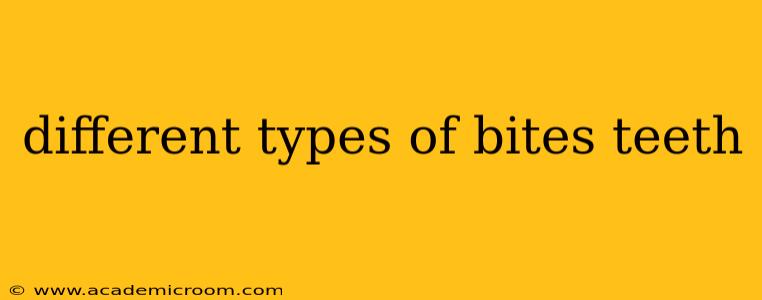A healthy, aligned bite is crucial for proper chewing, speaking, and facial aesthetics. However, many people experience variations in their bite, often requiring orthodontic intervention. Understanding the different types of bites is the first step toward addressing any concerns and achieving optimal oral health. This guide explores common bite variations, their causes, and potential treatments.
What is a Malocclusion?
Before diving into specific bite types, let's define malocclusion. A malocclusion is any deviation from the ideal relationship between the upper and lower teeth when jaws are closed. This can affect the alignment of individual teeth and the overall jaw position. Malocclusions are often classified into different categories based on the specific type of misalignment.
Common Types of Bites:
1. Overbite (Deep Bite):
An overbite, also known as a deep bite, occurs when the upper front teeth significantly overlap the lower front teeth. In severe cases, the upper teeth may even cover the lower incisors completely. This can lead to excessive wear on the lower teeth, gum problems, and difficulty chewing.
Causes: Genetics, thumb sucking (in childhood), and certain jaw growth patterns contribute to deep bites.
2. Underbite (Class III Malocclusion):
An underbite is characterized by the lower jaw extending beyond the upper jaw. The lower front teeth protrude in front of the upper front teeth. This can affect both appearance and function.
Causes: Genetic predisposition, jaw discrepancies, and premature loss of baby teeth are potential causes.
3. Open Bite:
An open bite occurs when there's a gap between the upper and lower teeth when the mouth is closed. This can affect both the front and back teeth. It can make chewing and speaking difficult.
Causes: Thumb or finger sucking, tongue thrusting, and certain medical conditions can contribute to open bites.
4. Crossbite:
A crossbite involves the misalignment of individual teeth or entire jaw segments. It's when the upper teeth bite inside the lower teeth or vice versa. This can affect a single tooth or multiple teeth.
Causes: Narrow upper jaw, premature loss of baby teeth, and habits like mouth breathing can all lead to crossbites.
5. Edge-to-Edge Bite:
In an edge-to-edge bite, the incisal edges of the upper and lower front teeth meet directly. This often results in increased wear on the teeth and potential TMJ problems.
Causes: Genetic factors and growth patterns are the most frequent contributors.
How are Bite Problems Diagnosed?
Diagnosing a bite problem typically involves a thorough dental examination. Your dentist will assess your teeth's alignment, jaw position, and the overall relationship between your upper and lower jaws. X-rays may be used to further evaluate jaw structure and root development.
What are the Treatment Options?
Treatment options for various bite problems vary depending on the severity and type of malocclusion. Common treatments include:
- Orthodontic Treatment (Braces): This is a widely used method for correcting bite problems in both children and adults. Braces gradually shift teeth into the correct position.
- Clear Aligners (Invisalign): These offer a less visible alternative to traditional braces.
- Jaw Surgery (Orthognathic Surgery): In severe cases, jaw surgery might be necessary to correct significant jaw discrepancies.
What are the Long-Term Effects of Untreated Bites?
Untreated bite problems can lead to various long-term oral health issues, including:
- Increased Tooth Wear: Improper alignment causes uneven wear and tear on teeth.
- Gum Disease: Misaligned teeth can make it difficult to clean effectively, leading to gum inflammation and potential gum disease.
- Temporomandibular Joint (TMJ) Disorders: Bite problems can strain the TMJ, causing pain and discomfort in the jaw joint.
- Speech Difficulties: Severe bite discrepancies can impact speech clarity.
- Chewing Problems: Difficulty in chewing can lead to digestive issues.
Addressing bite problems early on is essential to prevent potential complications and maintain optimal oral health. Regular dental checkups are vital for early detection and appropriate intervention. If you have concerns about your bite, consult your dentist for a comprehensive evaluation and treatment plan.
